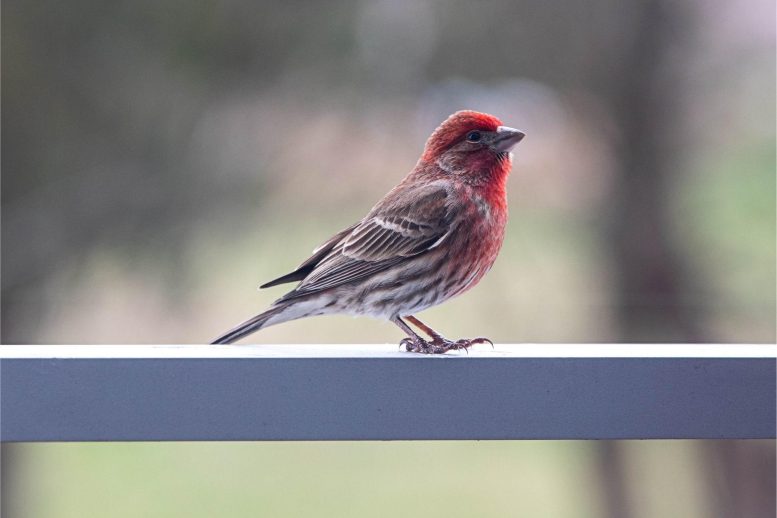
New research on house finches reveals that unlike many animals, these birds increase social interactions when sick, particularly during feeding, potentially heightening disease transmission. This study, contrasting with typical social distancing practices, provides novel insights into social behavior changes during illness and informs broader understanding of group dynamics and disease spread in social animals.
Social distancing when sick has become second nature to many of us in the past few years, but some sick animals appear to take a different approach. A recent study on house finches, conducted by Marissa Langager, a doctoral candidate in the Department of Biological Sciences at the College of Science has uncovered a surprising result.
Unlike other social animals that tend to isolate themselves when ill, either passively or actively, this gregarious backyard bird species gravitates toward healthy flock mates when they are sick, even more so than healthy birds do.
In particular, the study found, they want to eat together with their flock.
House Finches’ Unique Social Behavior When Ill
“The recent pandemic years of isolating and quarantining have shown us that social distancing to avoid getting sick can also have detrimental aspects for group living animals,” said Langager, whose research interests are social behavior and disease ecology.
“The costs of going solo may be particularly high for sick animals especially if they rely on their healthy groupmates to help them find food or avoid predators. Ultimately, this might be the reason that finches become even more social when sick, inadvertently putting their healthy flock mates at risk because bird feeders, where house finches like to gather to feed, are a major means of spreading disease.”

Dana Hawley (at left) and grad student Marissa Langager review data. Credit: Photo by Spencer Coppage for Virginia Tech
Langager’s study, “Let’s stick together: Infection enhances preferences for social grouping in a songbird species” with co-authors James S. Adelman, University of Memphis, and her advisor Dana Hawley, was recently published in the Ecology and Evolution journal.
Few studies prior to this one directly examined how acute infections caused by contagious pathogens influence social preferences, but instead focused more generally on why some animals evolve to become social in the first place and how social living benefits them.
Implications for Understanding Group Living
This research, Langager said, sheds light on how social animals behave when sick and can inform other studies in the field.
“Since all social animals — including humans — get sick, it is important to understand the costs and benefits of group living more broadly,” she said. “We may be able to use this information to predict disease spread in social animals. And it can also help us understand when and where we might expect healthy animals to evolve the ability to avoid sick groupmates who remain in the group at risk to their healthy groupmates
Further Research and Personal Motivation
Because of the unexpected results of the study, Langager wanted to know more about what exactly might be leading the sick finches to increased preferences for eating with a social group and is exploring this further in her doctoral dissertation.
“Maintaining social relationships can take a lot of energy for the birds I study. So if these birds are putting forth the energy to keep hanging around their social groups even when they are sick, it is most likely because of the benefit to them,” she said.
Langager has devised several experiments that will test whether group membership impacts a sick bird’s behavior by changing how it responds to a predator and affecting its ability to successfully forage for food.
“I have always been interested in the social behavior of animals, and Dr. Hawley’s lab focusing on various aspects of disease ecology using a gregarious species of bird has afforded me a number of opportunities to study their social interactions. It is the obvious and perfect place for me to conduct my research,” said Langager.
Reference: “Let’s stick together: Infection enhances preferences for social grouping in a songbird species” by Marissa M. Langager, James S. Adelman and Dana M. Hawley, 14 October 2023, Ecology and Evolution.
DOI: 10.1002/ece3.10627









Be the first to comment on "Feathered Paradox: The Unexpected Social Habits of Sick House Finches"